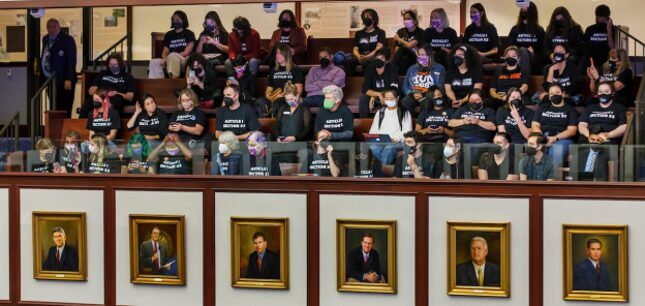Florida Bans Dozens of Pro-Abortion Protesters from the Capitol for an Entire Year
The activists were protesting an unconstitutional 15-week abortion ban that passed the House just after midnight on Thursday.
AbortionPolitics

Early Thursday morning, the Florida House of Representatives passed an unconstitutional 15-week abortion ban that one state lawmaker called “generous,” because she believes that life begins at fertilization. As the hours-long debate on the bill closed, Capitol Police forced activists protesting the legislation, House Bill 5, out of the Tallahassee chamber.
Capitol Police gave 25 protestors trespass notices for the overnight protest and banned them from entering the House building for an entire year, per the Tampa Bay Times. They also arrested one person, Florida Alliance of Planned Parenthood Affiliates statewide organizing director Lauren Brenzel, for allegedly failing to identify themselves, although Planned Parenthood disputes this. It’s not the first time protestors were removed from the Florida Capitol for protesting the bill: Republican legislators ejected student activists testifying against the abortion ban from a public House committee hearing on January 27.
Florida Planned Parenthood Action shared a video of Capitol Police trying to physically remove one protestor from their seat. The activists in this video were with Students for a Democratic Society, and a number of them had driven to the capitol from Tampa to protest, a Planned Parenthood spokesperson told Jezebel.
Laura Goodhue, executive director of the Florida Alliance of Planned Parenthood Affiliates, told Jezebel in a statement:
-

-

-

-

-

-

-

-

-

-

-

-

-

-

-

-

-

-

-

-

-

-

-

-

-

-

-

-

-

-

-

-

-

-

-

-

-

-

-

-









































